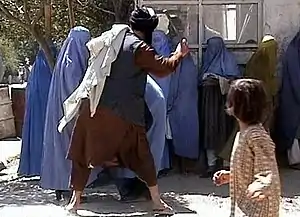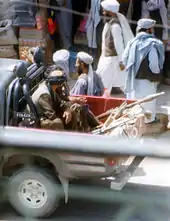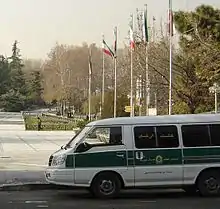Islamic religious police
Islamic religious police is an official vice squad which enforces religious observance and public morality on behalf of national or regional authorities based on its interpretation of sharia.[1][2] The practice is generally justified with reference to the doctrine of hisba, which is based on the Quranic injunction of enjoining good and forbidding evil, and refers to the duty of Muslims to promote moral rectitude and intervene when another Muslim is acting wrongly. In pre-modern Islam, its legal implementation was entrusted to a public official called muhtasib (market inspector), who was charged with preventing fraud, disturbance of public order and infractions against public morality. The office was revived in Saudi Arabia, and later instituted as a committee, aided by a volunteer force focused on enforcing religious observance. Similar institutions later appeared in several other countries and regions.[3] Powers and responsibilities of Islamic religious police have varied from country to country, with the latter commonly including enforcing Islamic dress code and prayer attendance, as well as preventing consumption of alcohol and public display of affection.
Islamic religious police organizations have been controversial both locally and internationally. Although these institutions tend to have support from conservative currents of public opinion, their activities are often disliked by other segments of the population, especially liberals, urban women, and younger people. Reforms made by Saudi rulers in 2016 sharply curtailed the authority of the Saudi religious police. Iranian president Hassan Rouhani has criticized Iran's religious police, but he does not have control over it under the constitution. In the Nigerian state of Kano, the religious police has had a contentious relationship with the civil police force. Some incidents where the religious police were widely viewed as overstepping their mandate have received broad public condemnation.
History
The classical doctrine of hisba, associated with the Quranic injunction of enjoining good and forbidding wrong, refers to the duty of Muslims to promote moral rectitude and intervene when another Muslim is acting wrongly.[3][4] Historically, its legal implementation was entrusted to a public official called muhtasib (market inspector), who was charged with preventing fraud, disturbance of public order and infractions against public morality. This office disappeared in the modern era everywhere in the Muslim world, including Arabia, but it was revived by the first Saudi state (1745–1818) and continued to play a role in the second (1823–87), due to its importance within Wahhabi doctrine. Under the third Saudi state, the most zealous followers of Ibn Sa'ud were appointed as muhtasibs, but their severity caused conflict with the local population and foreign pilgrims. In response, committees were established in Riyadh and Mecca in 1932 to check their excesses. In 1976 the committees were united under an official of ministerial rank, acting under direct royal command. The unified Committee for the Promotion of Virtue and the Prevention of Vice has been assisted by volunteers, who enforce strict rules of hijab, attendance of daily prayers and gender segregation in public places. With the rising international influence of Wahhabism, the conception of hisba as an individual obligation to police religious observance has become more widespread. This has led to the appearance of activists around the world who urge fellow Muslims to observe Islamic rituals, dress code, and other aspects of sharia,[3] with vigilante incidents in London (2013-2014) and Wuppertal, Germany (2014) resulting in criminal charges.
In Iran, hisba was enshrined in the constitution after the 1979 Revolution as a "universal and reciprocal duty", incumbent upon both the government and the people. Its implementation has been carried out by official committees as well as volunteer forces (basij).[3][5] Elsewhere, policing of various interpretations of sharia-based public morality has been carried out by the Kano State Hisbah Corps in the Nigerian state of Kano,[6] by Polisi Perda Syariah Islam in the Aceh province of Indonesia,[7] by the Committee for the Propagation of Virtue and the Prevention of Vice in the Gaza Strip, by the Taleban during their 1996-2001 rule of Afghanistan,[3] as well as by other groups.
Activities by country
Afghanistan


Afghanistan's Committee for the Propagation of Virtue and the Prevention of Vice was first instituted by the 1992 Rabbani regime, and adopted by the Taliban when they took power in 1996.[8] Taliban's department was modeled on a similar organization in Saudi Arabia.[9] It was closed when the Taliban was ousted, but the Chief Justice of the Supreme Court of Afghanistan reinstated it in 2003.[10] In 2006 the Karzai regime submitted draft legislation to create a new department, under the Ministry for Haj and Religious Affairs, devoted to the "Promotion of Virtue and Prevention of Vice".[8]
Iran

Guidance Patrol (Persian: گشت ارشاد,'[11] Gašt-e Eršād) is the main Islamic religious police, or vice squad in the Law Enforcement Force of Islamic Republic of Iran. It was established in 2005, succeeding previously defunct institutions of similar nature.[12] Its mission is to impose Islamic dress codes and norms of conduct in public, particularity regarding the hijab of women (but also some men)[13] who are deemed improperly dressed according to the dress code. In addition, the patrol also enforces Islamic codes of conduct in public, such as preventing the mingling of unrelated men and women without a male guardian (mahram) for the latter, and preventing other types of behavior that are un-Islamic. It has been viewed as a scourge by urban women, particular those from more affluent circles, who try to push the boundaries of dress code. President Hassan Rouhani has expressed opposition to the Guidance Patrol, but it does not fall under his constitutional jurisdiction.[11]
Malaysia
The Malaysian religious authority, known as the Federal Territories Islamic Religious Department (JAWI), enforces religious standards.[14] Its Chief of enforcement is Wan Jaafar Wan Ahmad.[15] Punishable offenses include khalwat, the offense of being in close proximity to any forbidden member of the opposite sex. Adultery is also an offense and may lead to up to two years in prison. According to local newspapers, the moral police have stopped hundreds of couples.[16] Other offenses include extra-marital sex, alcohol consumption, not fasting during Ramadan, and not visiting the mosque during Friday prayer. The department also punishes gay Muslims.[17] Malaysian morality police are often accused of overstepping their mandate, with legal confusion resulting from overlapping and ambiguously defined jurisdictions of secular and sharia-based laws.[11]
Nigeria
The Kano State Hisbah Corps is a religious police force in Nigeria's northern Kano state responsible for the enforcement of Sharia.[18] It was established by the state government in 2003 with the institutionalization of formerly local and privately maintained hisbah security units. It operates under the jurisdiction of a Hisbah Board composed of government officials, secular police officers, and religious leaders, and is highly decentralized with local units supervised by committees composed of officials and citizens in the communities in which they operate. The Hisbah Corps does not have authority to execute arrests and are allowed to carry only non-lethal weapons for self-defense. Hisbah officers who observe violations of Sharia are expected to alert the Nigeria Police Force (NPF). The duties of the Hisbah Corps include arbitrating disputes on a voluntary basis, verbally chastising violators of Sharia, and maintaining public order at religious celebrations. Hisbah are also trained to assist with disaster response operations.[19] The Hisbah Corps has had a contentious relationship with the NPF, with the latter frequently refusing to cooperate in enforcement of religious law,[20] and on multiple occasions arresting Hisbah members for trespassing private property.[21]
Some observers have compared hisbah activities in Nigeria to vigilante groups which have operated in other parts of the country, partly based on local tradition and partly as a response to failings of the police. However, as of 2004, Human Rights Watch was not aware of killings by hisba members, in contrast to other vigilante groups like the Bakassi Boys in the southeast and the Oodua People’s Congress in the southwest of the country, who have committed numerous extrajudicial killings and other abuses.[22]
Saudi Arabia
The Committee for the Promotion of Virtue and the Prevention of Vice, also referred to as muttawa, mutaween by other similar names, are tasked with enforcing conservative Islamic norms of public behavior, as defined by Saudi authorities. They monitor observance of the dress code, gender segregation in public spaces, and ensure that shops are closed during prayer times.[23] The institution has found general support among conservative currents of public opinion, although it is widely disliked by liberals and younger people.[11]
In some incidents, the Saudi religious police were broadly condemned in the country, including cases of breaking into private homes on suspicion of illicit behavior.[23] Perhaps the most serious and widely criticized incident for which they were blamed occurred on March 11, 2002, when they were accused of preventing schoolgirls from escaping a burning school in Mecca, because the girls were not wearing headscarves and abayas (black robes), and not accompanied by a male guardian. The firemen who arrived to help, were also males. Fifteen girls died and fifty were injured in the fire. Widespread public criticism followed, both internationally and within Saudi Arabia.[24] The Mutaween have also been criticized or ridiculed for use of flogging to punish certain misdeeds,[25][26] however, Saudi Supreme Court ended the flogging punishment in 2020.[27] The Mutaween is also responsible for banning Valentines Day gifts,[28][29] arresting priests for saying Mass,[30] and being staffed by "ex-convicts whose only job qualification was that they had memorized the Qur'an in order to reduce their sentences".[31]
Under the Saudi program Saudi Vision 2030, Crown Prince Mohammad bin Salman has introduced several reforms to the religious police, as well as extended liberties for women: The religious police may only work during office hours, cannot detain or make arrests, and may only submit reports to civil authorities.[32] In addition, the Mutaween can no longer restrict women from driving,[33] nor can they prohibit women from attending sporting events.[34]
Sudan
The Community Service Police serves as the Sudanese religious police. Originally called the Public Order Police, the enforcement agency was established in 1993 by President Omar al-Bashir.[11] The Public Order Law was initiated by the Sudanese government in the state of Khartoum in 1992, and later applied to all states. The name was changed in 2006. The Community Service Police is in charge of enforcing regulations on certain personal behaviors, including indecent clothing, alcohol consumption, offensive acts and seduction, among others.[35] In June 2015, 10 female students were charged with "indecent dress" after exiting their church. All of the women were wearing long-sleeved shirts and either skirts or trousers.[36] In December 2017, 24 women were arrested at a private gathering for wearing trousers. They were later released.[37] Punishment can include flogging and the payment of fines. The Public Order Court, which handles such cases, is a parallel court system which exercises summary judgements.[38] Many Sudanese resent the activity of the religious police as oppressive and arbitrarily intrusive, although it is supported by Salafists and other religious conservatives.[11]
Other countries
Other less prominent Islamic religious police forces have included:
- Polisi Syariat Islam of Indonesia's territory of Nanggroe Aceh Darussalam
- Committee for the Propagation of Virtue and the Prevention of Vice (Gaza Strip)
- Islamic religious police of the Chechen Republic of Ichkeria
- A religious police called al-Hisba operated as of 2017 in Idlib, which is ruled by Syrian rebels linked and allied to Al-Qaeda.[39][11]
- The militant group ISIL used religious police, commonly known as the Hisbah, in areas under its control.[40]
References
- Sultan, Sohaib (2004). The Koran For Dummies. Hoboken, New Jersey: John Wiley & Sons. pp. 238–40, 246. ISBN 978-0-764-55581-7.
- Cordesman, Anthony H. (2003). Saudi Arabia Enters the Twenty-first Century: The military and international security dimensions. 1. Westport, Connecticut: Praeger Publishers. pp. 294–96, 298. ISBN 978-0275980917.
- Thielmann, Jörn (2017). "Ḥisba (modern times)". In Kate Fleet; Gudrun Krämer; Denis Matringe; John Nawas; Everett Rowson (eds.). Encyclopaedia of Islam (3rd ed.). Brill. doi:10.1163/1573-3912_ei3_COM_30485.
- Mack, Gregory (2018). "Ḥisbah". In Jonathan Brown (ed.). The Oxford Encyclopedia of Islam and Law. Oxford University Press.
- "Iran's Basij Force – The Mainstay Of Domestic Security". RadioFreeEurope/RadioLiberty. 15 January 2009.
- Olaniyi, Rasheed Oyewole (2011). "Hisbah and Sharia Law Enforcement in Metropolitan Kano". Africa Today. 57 (4): 71–96. doi:10.2979/africatoday.57.4.71. S2CID 154801688.
- Uddin, Asma (2010). "Religious Freedom Implications of Sharia Implementation in Aceh, Indonesia". University of St. Thomas Law Journal. 7 (3): 603–48. SSRN 1885776.
- Esfandiari, Golnaz (18 July 2006). "Afghanistan: Proposed Morality Department Recalls Taliban Times". Radio Free Europe. Archived from the original on 28 October 2008. Retrieved 28 October 2008.
- Rashid, Ahmed (2001). Taliban: Militant Islam, Oil and Fundamentalism in Central Asia (1st Pan ed.). London: Pan Books. p. 106. ISBN 978-0330492218.
- Franco, Claudio (7 December 2004). "Despite Karzai election, Afghan conservatives soldier on". Eurasianet. Archived from the original on 4 August 2008. Retrieved 4 August 2008.
- "Who are Islamic 'morality police'?". BBC News Online. 22 April 2016. Retrieved 2 July 2018.
- Erdbrink, Thomas (7 May 2014). "When Freedom Is the Right to Stay Under Wraps". The New York Times. Retrieved 12 August 2016.
- Sharafedin, Bozorgmehr (20 April 2016). "Rouhani clashes with Iranian police over undercover hijab agents". Reuters. Retrieved 12 August 2016.
- "Mustafa Akyol: Jawi didn't like my talk on commonalities between Islam, Christianity". Malay Mail. 28 September 2017. Retrieved 18 April 2018.
- "Jawi ramps up Ramadan enforcement". Malaysiakini. 28 May 2017. Retrieved 18 April 2018.
- "Malaysia: The sordid failures of the illicit sex police". The Independent. Singapore. 18 February 2017. Retrieved 18 April 2018.
- Salvá, Ana (22 February 2017). "Here comes the Malaysian morality police". The Diplomat. Retrieved 18 April 2018.
- "The enforcement of Shari'a and the role of the hisbah". hrw.org. Human Rights Watch. Retrieved 27 June 2015.
- Olaniyi, Rasheed (2011). "Hisbah and Sharia Law Enforcement in Metropolitan Kano". Africa Today. 57 (4): 71. doi:10.2979/africatoday.57.4.71. S2CID 154801688.
- "Nigeria's religious police: Out on patrol". The Economist. 2010. Retrieved 27 June 2015.
- Olaniyi, Rasheed (2005). Community Vigilantes in Metropolitan Nigeria. IFRA. p. 66.
- "The enforcement of Shari'a and the role of the hisbah". Human Rights Watch. 2004.
- "Saudi minister rebukes religious police". BBC News. 4 November 2002.
- "Saudi police 'stopped' fire rescue". BBC News. 15 March 2002.
- Feldner, Yotam (8 January 2004). "The Saudi Media Debates Flogging by the Saudi Religious Police". Middle East Media Research Institute. Retrieved 13 November 2014.
- "Saudi Arabia: Gross Human Rights Abuses Against Women" (PDF). Amnesty International. 27 September 2000. Retrieved 2 July 2018.
- "Saudi Arabia to end flogging as form of punishment - document". Reuters. 2020-04-24. Retrieved 2020-04-24.
- Schwartz, Stephen; al-Alawir, Irfan (5 March 2007). "Valentine's Day in Saudi Arabia". The Weekly Standard. Vol. 012 no. 24. Retrieved 13 November 2014.
- "200 Arrested in Mina for Celebrating Valentine's Day". Arab News. 18 February 2004.
- "Catholic priest arrested and expelled from Riyadh". AsiaNews. 10 April 2006. Retrieved 13 November 2014.
- Wright, Lawrence (2006). Looming Tower: Al Qaeda and the Road to 9/11. New York: Knopf. p. 149. ISBN 978-0375414862.
- Chan, Sewell (15 April 2016). "Saudi Arabia Moves to Curb Its Feared Religious Police". The New York Times. Retrieved 18 April 2018.
- Hubbard, Ben (26 September 2017). "Saudi Arabia Agrees to Let Women Drive". The New York Times. Retrieved 18 April 2018.
- "Saudi women should not have to wear abaya robes, top cleric says". BBC News. 10 February 2018. Retrieved 18 April 2018.
- "More than 40,000 public order cases annually in Sudan capital: SDFG". Dabangasudan.org. 7 January 2018. Retrieved 18 April 2018.
- Eltahawy, Mona (19 August 2015). "The Middle East's Morality Police". The New York Times. Retrieved 18 April 2018.
- "Sudanese women arrested 'for wearing trousers' released". The New Arab. 11 December 2017. Retrieved 18 April 2018.
- Köndgen, Olaf (30 October 2017). The Codification of Islamic Criminal Law in the Sudan: Penal Codes and Supreme Court Case Law under Numayri and al-Bashir. Brill. p. 85. ISBN 978-9004357082.
- McKernan, Bethan (16 February 2017). "Syrian schoolgirl arrested by religious police for 'inappropriate clothing' freed after classmate protest". The Independent. London. Retrieved 2 July 2018.
- Charters, Justen (11 August 2014). "Life Under ISIS Religious Police is Brutal and Merciless". Independent Journal Review. Retrieved 18 April 2018.
Further reading
- Cordesman, Anthony H. (2003). Saudi Arabia Enters the Twenty-first Century: The military and international security dimensions. 1. Westport, Connecticut: Praeger Publishers. ISBN 978-0275980917.
External links
| Wikiquote has quotations related to: Religious police |
- "Sharia police block women's rally". BBC News. 19 January 2009.
- Simanjuntak, Hotli (8 February 2010). "Sharia police: who are they?". The Jakarta Post.
- Mahamud, Faiza (13 April 2017). "Minneapolis Muslims protest 'sharia' vigilante in Cedar-Riverside area". Star Tribune.